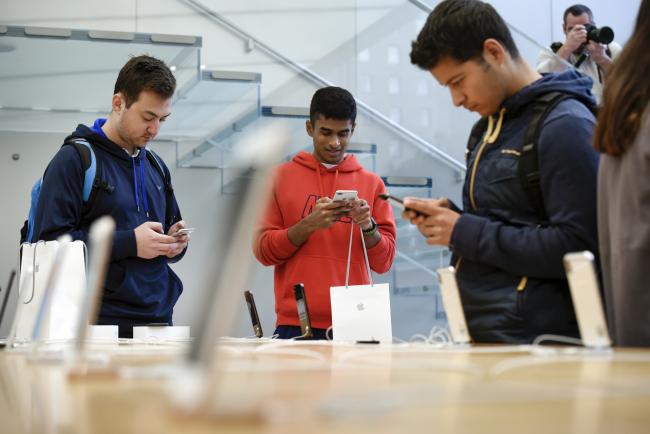(Bloomberg) -- Apple Inc (NASDAQ:AAPL). looks like it’s having a not-so Merry Christmas.
Analysts lowered iPhone X shipment projections for the first quarter of next year, citing signs of lackluster demand at the end of the holiday shopping season, and the company’s shares fell Tuesday along with those of some suppliers.
Sinolink Securities Co. analyst Zhang Bin said in a report Monday that handset shipments in the period may be as low as 35 million, or 10 million less than he previously estimated. "After the first wave of demand has been fulfilled, the market now worries that the high price of the iPhone X may weaken demand in the first quarter," Zhang wrote.
JL Warren Capital LLC said shipments will drop to 25 million units in the first quarter of 2018 from 30 million units in the fourth quarter, citing reduced orders at some Apple suppliers. The drop reflects “weak demand because of the iPhone X’s high price point and a lack of interesting innovations,” the New York-based research firm said in note to clients Friday.
"Bad news here is that highly publicized and promoted X did not boost the global demand for iPhone X," according to the note.
The shares fell 2.7 percent to $170.30 in early trading in New York Tuesday. U.S.-based suppliers like Lumentum Holdings Inc., Cirrus Logic Inc. and Broadcom (NASDAQ:AVGO) Ltd. also tumbled.
Apple has been counting on a redesigned 10th anniversary iPhone to boost shipments as its market value advances toward $1 trillion. The Cupertino, California-based company is facing new challenges from Samsung (LON:0593xq) Electronics (KS:005930) Co., which is quickly recovering from the Galaxy Note 7’s recall after fires. In the meantime, Chinese brands such as Huawei, Oppo and Xiaomi are also luring away potential customers in China and other emerging markets such as India.
Taiwan Report
Apple is said to have trimmed its first-quarter sales forecast to 30 million units from 50 million, Taiwanese newspaper Economic Daily News reported, citing unidentified supply chain officials. It also said Hon Hai Precision Industry Co.’s main iPhone X manufacturing hub in Zhengzhou, China, stopped recruiting workers. The company also known as Foxconn is the sole iPhone X assembler, and also makes the handsets in Shenzhen and Chengdu.
Shares of Asian suppliers, such as Lens Technology Co., Shenzhen Desay Battery Technology Co. and Largan Precision Co. fell Monday on the report. Lens recovered some of the losses on Tuesday, while Largan continued to slide. Shenzhen Desay was little changed.
Hon Hai shares slid for a second day Tuesday, on track for the lowest close since March. Touch screen maker General Interface Solution Holding Ltd. plunged 8.4 percent Tuesday after slipping slightly Monday.
An Apple representative declined to comment on production arrangements. Foxconn said in an emailed statement that company policy prevents it from commenting on such matters.
Apple received a rare downgrade last week from Nomura Instinet analyst Jeffrey Kvaal, who said iPhone X sales as well as other positive factors are already baked into the stock price. He lowered his rating to "neutral" from "buy."
The stock has soared 51 percent this year, bringing its market value to almost $900 billion.
Supply, Demand
Apple’s efforts to increase iPhone X production in recent months have made supply and demand fairly balanced at the moment, said Jia Mo, an analyst at Canalys in Shanghai.
"The market will still hold high expectations for Apple’s 2018 products if Apple introduces more devices with iPhone X’s key features to cover a wider price range," he said.
Customers seem to be opting for cheaper models of the iPhone, according to Cowen & Co., which says that suggests Apple failed to cram enough new technology into the iPhone X to justify a $999 price tag.
New features such as facial recognition and virtual reality herald Apple’s vision for future smartphones, but other issues such as the lack of augmented-reality apps have cooled buyer buyer interest in those technologies.
To contact Bloomberg News staff for this story: Gao Yuan in Beijing at ygao199@bloomberg.net.
To contact the editors responsible for this story: Robert Fenner at rfenner@bloomberg.net, Jeff Kearns, Peter Elstrom
©2017 Bloomberg L.P.
